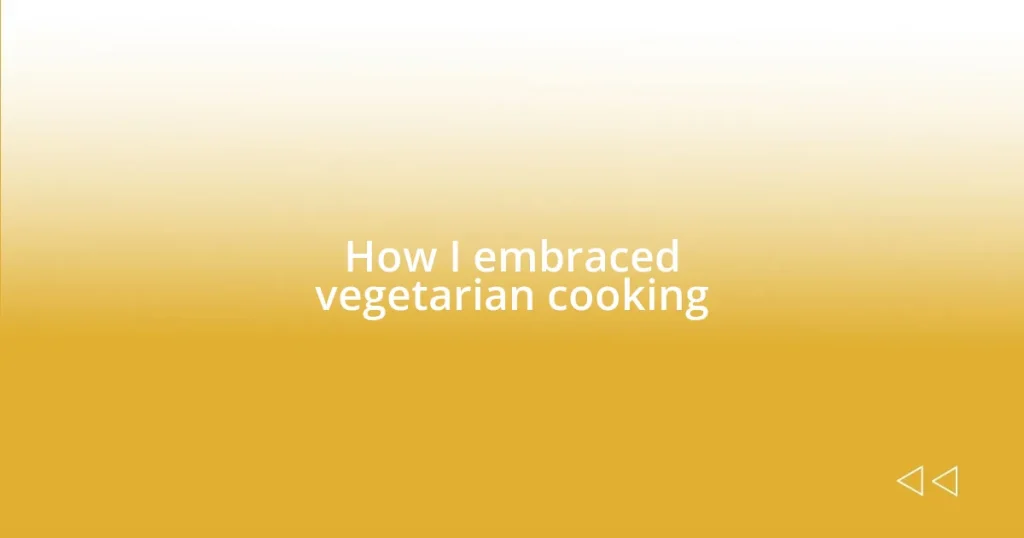Key takeaways:
- Embracing vegetarian cooking transformed the author’s kitchen into a creative space, fostering a passion for exploring new flavors and textures.
- Adopting a vegetarian diet can lead to improved health, increased energy, and a sense of responsibility towards environmental sustainability.
- Essential kitchen tools, like a sharp chef’s knife and blender, enhance the cooking experience and facilitate experimentation with ingredients.
- Meal planning encourages creativity, balance, and spontaneity, making the cooking process enjoyable and rewarding.

My journey to vegetarian cooking
When I decided to embrace vegetarian cooking, it felt a bit daunting at first. I remember standing in the produce aisle, overwhelmed by all the vibrant colors and unfamiliar vegetables. How could something so green and leafy become the center of my meals?
One day, I stumbled upon a recipe for a spicy chickpea stew that seemed approachable. As I added spices and watched the chickpeas simmer, I felt a wave of excitement wash over me. It was a moment of discovery—my kitchen was transforming into a space for creativity, rather than just a place for routine.
As I continued my journey, I found that cooking vegetarian meals ignited a new passion within me. It wasn’t just about swapping out meat; it was about exploring flavors and textures that I had overlooked before. Each recipe became an adventure, making me wonder—what else might I be missing in my culinary experiences?

Understanding the benefits of vegetarianism
Understanding the benefits of vegetarianism is quite enlightening. Personally, I’ve found that adopting a vegetarian diet can lead to improved health outcomes. Whenever I focus on whole foods like fruits, vegetables, legumes, and nuts, I directly experience an increase in my energy levels and overall well-being. It’s remarkable how my body responds to these nutrient-dense foods compared to meals heavy in processed ingredients.
Another significant advantage I’ve observed is the environmental impact of vegetarianism. By choosing plant-based meals, I feel like I’m contributing to a more sustainable future. I remember reading about the vast resources needed for livestock farming. Since then, making more conscious decisions about what I eat has filled me with a sense of purpose and responsibility. Each vegetarian meal I prepare seems less like a sacrifice and more like a small step toward bettering the planet.
Lastly, let’s talk about creativity in the kitchen. Embracing vegetarian cooking has expanded my culinary horizons. I’ve started experimenting with different spices, teetering on the edge of weird combinations that surprisingly work wonders. One memorable evening, I whipped up an unexpected dish of roasted beets and feta with a sprinkle of walnuts. It sparked a joy similar to that of childhood art projects, where the fun was in the exploration and discovery of what could result from combining colorful ingredients.
| Benefit | Description |
|---|---|
| Health Improvements | Adopting a vegetarian diet can lead to enhanced energy levels and overall well-being. |
| Environmental Impact | Choosing plant-based meals contributes to a sustainable future by reducing resource demand for livestock farming. |
| Culinary Creativity | Experimenting with vegetarian recipes fosters creativity and exploration in cooking. |

Essential tools for vegetarian cooking
When I dove into vegetarian cooking, I quickly realized that having the right tools made all the difference. Initially, I thought my old kitchen gadgets would suffice, but as I started experimenting with different ingredients, I discovered that certain items truly enhance the experience. For instance, a good knife became my best ally—it transformed the tedious task of chopping and slicing into a joyful ritual.
Here’s a quick list of essential tools that made my transition smoother:
- Chef’s Knife: A sharp, versatile knife is crucial for efficient and enjoyable chopping.
- Cutting Board: A sturdy, spacious surface protects your countertops while allowing you to slice with ease.
- Blender: Perfect for smoothies, soups, and sauces; it opens up a world of creamy textures.
- Steamer Basket: Essential for retaining nutrients while cooking vegetables to perfection.
- Cast Iron Skillet: Great heat retention and versatility make it ideal for everything from stir-fries to baking.
- Measuring Cups and Spoons: Precision in cooking can lead to delicious results, especially when you’re indulging in a new recipe.
Having the right tools not only streamlines the cooking process but also infuses a bit of joy into the experience. Just the other day, I plopped down with my cutting board, a bright red bell pepper, and a freshly harvested zucchini. Each slice felt empowering, knowing that the right tools were helping me create something vibrant and nourishing. It’s moments like these that remind me how much cooking can be more than just a task—it’s a fulfilling journey, and having the right tools makes it all the more delightful.

Planning a vegetarian meal
Planning a vegetarian meal might seem daunting at first, but I’ve found it to be an exciting challenge each time I enter the kitchen. I typically start by assessing what fresh produce I have on hand. Just a few days ago, I stumbled upon a bounty of ripe tomatoes and vibrant greens in my fridge. It struck me—these ingredients could turn into a delightful summer salad or maybe even a comforting vegetable stew.
As I outline my meal, I consider balance—aiming for the perfect mix of protein, carbs, and healthy fats. For instance, on those busy weekdays, I often whip up a quick quinoa salad with chickpeas and avocado. The combination not only makes me feel satisfied but also fuels my body for the tasks ahead. When I share this dish with friends, their smiles tell me that planning and preparing vegetarian meals can spark joy and connection.
Ultimately, creating a meal plan calls for a bit of spontaneity and creativity. I like to keep my recipes flexible and open to interpretation. Last week, when I invited friends over, I set up a “build-your-own bowl” station with various toppings. Seeing them get excited about mixing their own ingredients reminded me that cooking is as much about the journey as it is about the outcome. It’s these moments that make planning vegetarian meals not just a necessity, but a delightful experience.

Exploring vegetarian ingredients
As I began exploring the world of vegetarian ingredients, I quickly realized how vibrant and diverse plant-based foods can be. One day, I wandered into my local farmer’s market, captivated by the rainbow of fresh produce. The moment I laid my eyes on those deep purple eggplants and bunches of fragrant herbs, I felt a wave of inspiration wash over me. It’s incredible how the right ingredients can transform a simple dish into something extraordinary.
Diving into vegetarian cooking, I found myself pleasantly surprised by the vast array of grains available. Quinoa became my go-to staple, not just for its protein content but also for its delightful texture. When I first tried cooking it with a hint of garlic and some sautéed spinach, the flavors just danced on my palate! I often wonder: how can something so humble be turned into such a delicious meal? It’s those small culinary experiments that make cooking truly exciting and personal.
Then there are legumes—my newfound love! Lentils, chickpeas, and black beans have added incredible richness to my meals. I recall a rainy afternoon when I simmered lentils with spices and vegetables, filling my kitchen with an inviting aroma. As I enjoyed that warm bowl of goodness, I couldn’t help but reflect on how these ingredients not only fill our stomachs but also nourish our spirits. Embracing vegetarian cooking has opened my eyes to a world where every ingredient tells a story, and each dish is a chance to connect with nature and my own well-being.

Easy vegetarian recipes to start
One of my favorite easy vegetarian recipes is a simple stir-fry that I often rely on during hectic days. With just a few colorful veggies, like bell peppers and broccoli, combined with tofu for protein, I create a delicious dish that’s both satisfying and quick to prepare. I toss it all in a hot pan with a splash of soy sauce and some sesame oil, and within minutes, dinner is served. Isn’t it amazing how a handful of ingredients can come together so beautifully?
Another go-to for me is a veggie-packed pasta dish. I love cooking whole wheat pasta and tossing in seasonal vegetables like zucchini and cherry tomatoes along with fresh basil. The vibrant colors and flavors remind me of summer evenings spent with friends. To add a twist, sometimes I riff on traditional pesto by blending sunflower seeds and garlic with a bunch of fresh greens—what a nurturing way to pack in the nutrition! Have you ever tried creating your own sauces? It’s a liberating experience that I highly recommend.
And let’s not forget the magic of soups! There’s something cozy about simmering a pot of vegetable soup after a long day. I usually start with a base of onions and garlic, then add in whatever vegetables I have, like carrots and spinach, along with vegetable broth. The aroma fills my kitchen and instantly lifts my spirits. In fact, I find every bowl of soup tells a story, reminding me of the comfort of home-cooked meals. Have you ever taken the time to make a soup from scratch? There’s a certain joy in nourishing yourself that way.

Tips for successful vegetarian cooking
When it comes to successful vegetarian cooking, I’ve learned that seasoning is everything. The first time I attempted a vegetable curry, I was a bit conservative with my spices, and honestly, it fell flat. But when I dared to generously sprinkle in garam masala and turmeric, everything changed. The aromas wafted through my kitchen and wrapped me in warmth. It made me realize that a dish can be transformed with just the right combination of herbs and spices. Have you ever thought about how flavors can change a meal entirely?
Another tip is to embrace meal prep. I’ve found that dedicating a couple of hours on a Sunday to chop vegetables and prepare grains saves me so much time during the week. There’s something satisfying about opening the fridge to find neatly packed containers of fresh ingredients ready to go. It’s like having a mini-restaurant at home! I once dropped everything and prepared a huge batch of chickpea salad; having it available for quick lunches made me feel accomplished. Have you considered how meal prepping could simplify your cooking process?
Don’t underestimate the power of experimentation in vegetarian cooking. The first time I used jackfruit as a meat substitute, I was both excited and apprehensive. I remember staring at the canned fruit, wondering if it could really mimic pulled pork. I seasoned it with BBQ sauce, tossed it in a sandwich, and took a bite. To my surprise, it was delicious! This moment taught me that stepping outside my comfort zone can lead to delightful culinary discoveries. What new ingredients are you curious to try in your cooking?















